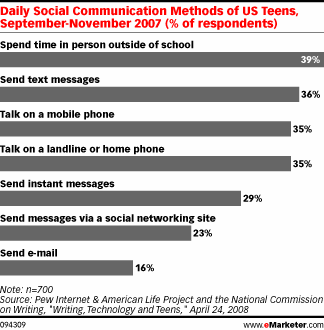Lots of chatter about Twitter being offered $500MM by Facebook. Some think Twitter is crazy not to take it, while many others correctly point out that $500MM is not $500MM if it’s in stock. While Facebook may hold out the Microsoft $15 billion valuation (an artificial auction given how strategically important the advertising deal was to Microsoft, not to mention that they received preferred stock), my discussions with a number of people tell me Facebook common stock has been trading hands at somewhere between $3 and $4 billion in value. If you’re Twitter, that’s the difference between owning 3% of Facebook and 12.5%. That’s a huge difference in ownership when it comes to upside!
Facebook is an unbelievable social hub, where casual communications amongst friends are mainstay. Facebook has also been incredibly successful with mobile usage. There are over 15 million active users of Facebook Mobile, growing over 300% from last year! By comparison, Twitter “only” has 6 million active users of the product. If Facebook is the dominant player in casual communications and has an incredibly strong product in the Mobile space, why would it make a “buy” decision versus a “build” one?
I think Facebook is looking to take advantage of this downturn in the economy to become the largest social network and communications hub out there. It turned down some huge offers to stay independent. There’s no turning back now. Twitter is the poster child “Web 2.0” company – incredible usage, no revenues. If Facebook could get Twitter for a reasonable price (ie, selling them on a $15 billion valuation), they could clearly capitalize on Twitter’s market momentum. Pick up a viral service that has got a high degree of overlap with your own users, and use the integrated service to draw everyone else from Facebook onto the service. Even if they don’t buy Twitter, Facebook must be working on some sort of SMS-based Twitter-like feature. They might even add a Loopt style service alongside the same platform. Extrapolating from the chart below, text messaging is a very important communications medium for Facebook’s core audience, and clearly offering a full feature set would rank high in ensuring Facebook’s dialogue with their core audiences.

Looking at the chart above also provides some hint as to where Facebook might be headed next. In my mind, the next most obvious place for them to go is email. While younger kids view email as the “formal” way of communicating with adults, its usage is uniform across age demographics (see below). And we all know how incredibly sticky email addresses are. Yahoo! has over 260 million users of its email service, and AOL has long maintained audiences with its legacy email accounts. Gmail by Google, while growing, is a surprising distant follower. I’d bet many of the younger users of Facebook would easily use an “@facebook” account, or any separate brand Facebook might come up with, especially if it was appropriately integrated into their social messaging platform. Facebook might even do something really interesting by providing POP access to its social messages to drive adoption. Putting aside the details of how Facebook sorts/presents email from chat or social messages, it would seem like a great way to start building an organic presence in email for a huge audience you control.

Other possibilities could be expanding Facebook’s chat platform. While they have their own internal chat function, why not approach Meebo or eBuddy to acquire their tens of millions of interoperable IM users. Like Twitter, they likely share attributes of “high usage, light revenues”. In addition, Facebook could launch a VoIP based voice service that it embeds into their chat platform and their smart phone mobile applications.
Imagine the converged communications possibilities. Facebook would have the SMS market cornered via Twitter or its own offering, it could have not only the internal usage of their Chat application but also corner interoperable IM services via acquisition, it could have users starting their sticky email “lives” with the launch of @Facebook/ @nameyourbrand so users can communicate with all those “adults” outside the Facebook ecosystem, it could have applications messaging enabled by the open Facebook platform, and it could have voice (VoIP) services embedded via the web and the downloadable mobile app. While pure speculation on my part, one can see how the innocent Twitter play could be one small step towards Facebook aggressively trying to converge our messaging platforms.

